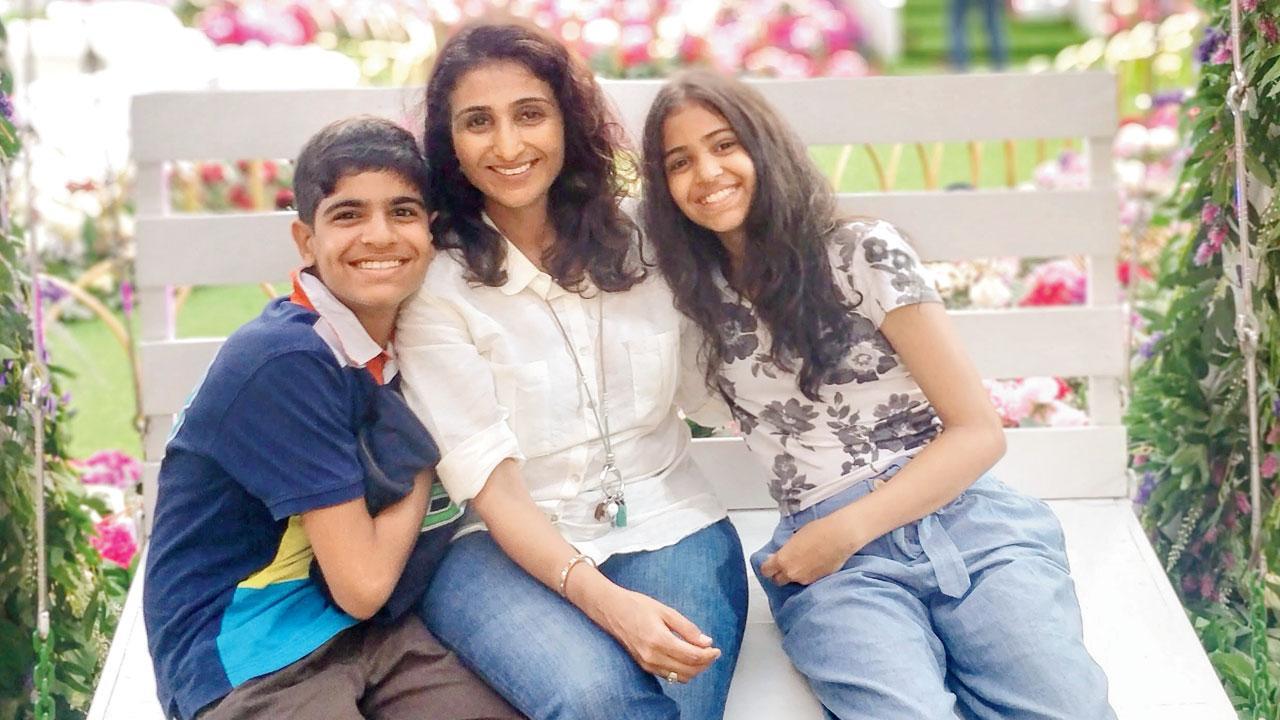A mother, who turned therapist after her son was diagnosed with autism, looks back at her journey with anger and acceptance in a new book

Writer Gopika Kapoor with her twins Vir and Gayatri
It was "the diagnosis" that revealed itself on a nippy January morning of 2008, which suddenly altered the life of a family. Gopika Kapoor, a mother of twins, remembers walking into Umeed Child Development Centre, almost confident that one of her kids, Vir, was dyslexic. Instead, a few minutes into the appointment with the non-profit's founder, developmental paediatrician Dr Vibha Krishnamurthy, she heard the word "autism". "There are a few times in my life when I have had an intense sinking feeling, like the bottom of my stomach had fallen through my body onto the ground…," Kapoor writes in her new book, Beyond the Blue (Notion Press).
ADVERTISEMENT
The book is about this journey of holding it together—learning, unlearning, and coming to terms with the reality of raising a child with autism. She named it so, because "blue is the colour associated with autism".
"When Vir was diagnosed, and I was looking for material to read, everything seemed to have been written from a Western perspective, which I couldn't relate to entirely. The [Indian] subcontinent is culturally different from the West, and it was important to have an Indian context when discussing and understanding autism. I found that missing," says Kapoor. That it took her 12 years to write this book had to do with her struggle to accept herself as an autism mother. "Writing the book was a process, because even reaching a stage of acceptance where I could talk about it, took time. When I joined as therapist [at Umeed], I wouldn't tell my patients that I had a kid on the spectrum. I just didn't want anyone to know," she admits, in a telephonic interview.

Gopika Kapoor
The disclosure didn't happen overnight. By Kapoor's own admission, it took years for her family of four to accept and celebrate the difference that united them. Her book revisits the many stages of Vir's journey, who is now 15, and how each member coped through this new normal that became their life.
As a child, Kapoor writes how her son Vir was different from his more outgoing twin sister, Gayatri. When relatives would comment that Vir was aloof, and incoherent or unresponsive to his name being called, Kapoor recalls getting defensive. While autism is a "largely invisible disability", this denial, she says, prevents many parents from noticing red flags, and seeking out early intervention. She breaks down her own experience after the diagnosis, as one of living through the five stages of grief—a concept conceived by psychiatrist Elizabeth Kubler-Ross—that begins with denial, before it makes way for feelings of anger, bargaining, sadness and acceptance.
Trudging through the grief, Kapoor and her husband Mohit, cut down on their very active social life, to concentrate on Vir. "I think the 'bargaining phase' was the toughest," she says. During this time, Kapoor recounts experimenting with past-life therapy for herself, and changing Vir's food, attempting the gluten-free, casein-free (GFCF) diet, which was said to have miraculous results for children with autism, but met with little success with her son. However, it was the Relationship Development Intervention (RDI) programme—a family-based, behavioural treatment which addresses the core symptoms of autism—that put a strain on the couple's relationship. "It was not like we experienced any of those phases [of grief], one after the other. Sometimes, it all came together. Small things would trigger my anger. It was very exhausting."
Looking back, she thinks, if she had seen a counsellor, she would have been in a better place. Later, training at Umeed, and starting out as junior therapist, working with different children, helped immensely. "It's almost as if you are trying to decipher this puzzle, and once you crack it, you just fall in love with these kids," says Kapoor, who was with Umeed until January this year, and currently consults with families in Mumbai having children with autism.
Having said that, she says there is no foolproof formula or common line of therapy, when dealing with children with special needs. "Each child is different. There are children who will take years to learn one skill, and there are those who learn faster. They all make progress, but the rate at which they make it, is very different."
Writing this book, she says, "has made me accept Vir even more". "It has built renewed acceptance and appreciation. I do get a little wistful sometimes, worrying, if he will ever find somebody [a life partner]? But, I have learned to have faith in him [over time]. He has done things that I never thought he'd do, like learn to read, walk down the road, or even go shopping. So, I keep pushing him. Recently, over Diwali, when we were in Goa, he wanted to go jet-skiing. We allowed him to. We were thrilled that he could do it on his own. My son continues to amaze me."
The red flags
A child with autism spectrum condition (ASC) may display the following:
. Not respond to their name by 12 months of age
. Not point at objects to show interest (such as an airplane flying overhead) by 14 months
. Not play "pretend" games (such as pretend to "feed" a doll) by 18 months
. Avoid eye contact and want to be alone
. Have trouble understanding other people's feelings or talking about their own
. Have delayed speech and language skills
. Repeat words or phrases over
. Get upset by minor changes
. Have obsessive interests
. Flap their hands, rock their bodies, or spin in circles, exhibiting unusual reactions to the noises or smells around them
Courtesy: Beyond the Blue, Gopika Kapoor
Keep scrolling to read more news
Catch up on all the latest Mumbai news, crime news, current affairs, and a complete guide from food to things to do and events across Mumbai. Also download the new mid-day Android and iOS apps to get latest updates.
Mid-Day is now on Telegram. Click here to join our channel (@middayinfomedialtd) and stay updated with the latest news
 Subscribe today by clicking the link and stay updated with the latest news!" Click here!
Subscribe today by clicking the link and stay updated with the latest news!" Click here!






